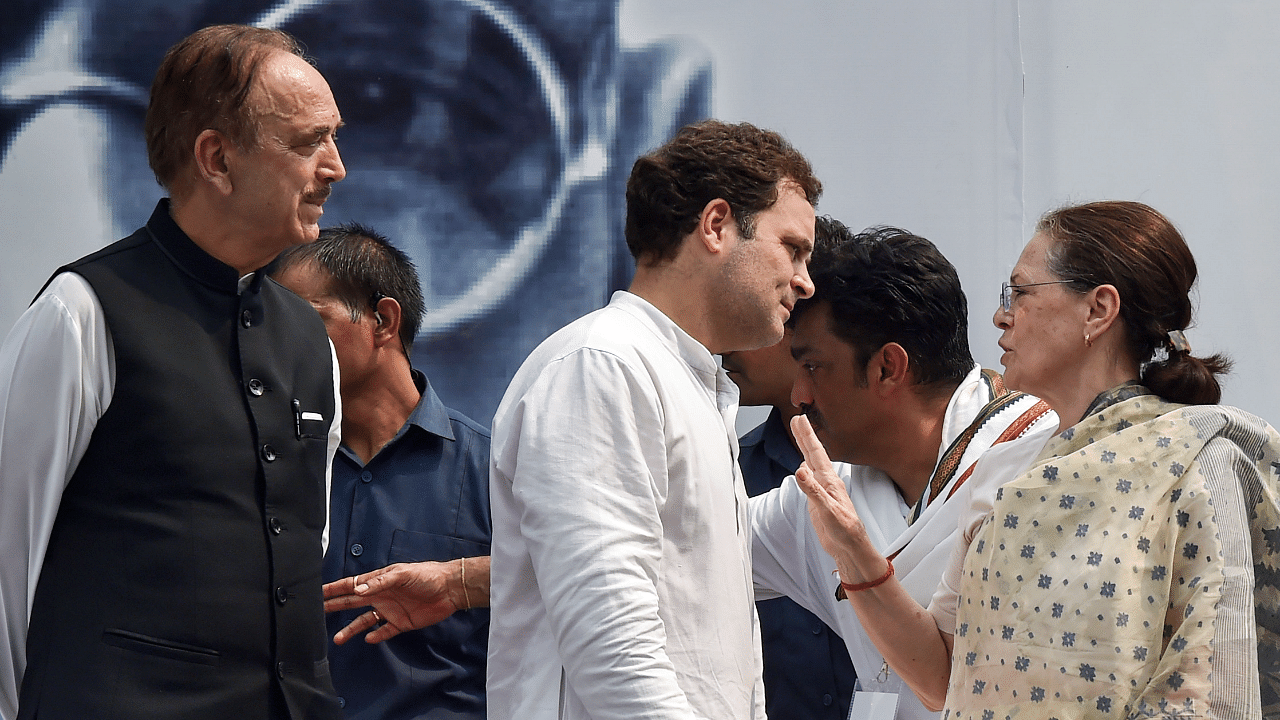
On August 26, 2022, Ghulam Nabi Azad resigned from the Congress, severing his five-decade-long ties with the party. Azad's five-page resignation letter attacked the coterie that ran the party and blamed Rahul Gandhi for all the ills afflicting the party. Since then, Azad has floated the Democratic Azad Party in Jammu and Kashmir. It is, however, yet to be registered with the Election Commission of India.
On November 7, three months after his resignation letter, Azad bowled another googly. During his tour of his native district in Jammu, Azad said: "Only Congress could challenge the BJP in Gujarat and Himachal Pradesh assembly elections, while the Aam Aadmi Party (AAP) is merely a party of the Union Territory of Delhi."
"I am not against the policy of secularism of the Congress. But my opposition and the subsequent parting of ways was on the issue of its weak organisational system. I still want the Congress to perform well in Gujarat and Himachal polls. The AAP isn't capable of doing so," he said.
Do his recent comments indicate the possibility of Azad's ghar wapsi to the Congress? Azad said more. "The Congress takes along everybody, Hindu, Muslims, Sikhs...the AAP can't do anything in these poll-going states, they have failed in Punjab, and the people of Punjab will not vote for them again," he said.
Azad made his comments in the context of hectic preparations for the yet-to-be-announced Jammu and Kashmir Union Territory (UT) assembly elections, and he is on a whirlwind tour of the hilly areas to mobilise public support when he surprised everyone with his statements. This change of heart cannot be without deep political meaning and is undoubtedly based on his pre-poll and post-poll calculations. It is also an attempt to ward off criticism that he was soft towards the BJP while keeping post-poll options open.
But for his criticism of the Congress in his resignation letter, Azad had avoided referring to any political parties in his subsequent interviews or public addresses. He had also avoided referring to the restoration of Article 370, which left his supporters somewhat confused.
The fact is that Azad's core support base might lie in the Muslim-dominated areas of J&K, but he enjoys considerable goodwill among other sections of the society as well due to his clean and secular image and good track record as the chief minister of the erstwhile state. Farooq Abdullah's National Conference is also eyeing this core (read Muslims) constituency and has areas of influence in these areas. With the BJP, in its own way, trying to either influence or disturb this core, there is a dire need for Azad to protect his support base over which he wishes to build an edifice of his new political innings.
His initial silence over the issue of Article 370, though he has announced a three-point charter, namely the restoration of statehood, protection of land rights and job rights of the domiciles or original inhabitants, that draws strength from the same source, had created confusion. Many in J&K misconstrued his silence as towing the BJP line on this issue and helping further the party's electoral chances in the otherwise Muslim-majority UT by causing division.
Interestingly, the issue of restoration of special status and protection of land and job rights are being echoed, of late, in the entire UT, cutting across the two regions - Jammu and Kashmir - but also across religions and castes. The majority of Azad's core support base comprises Congress supporters. Azad had been the unchallenged leader of the party after the ouster of veterans such as Mufti Mohammed Sayeed. Therefore, he could not have ignored the Congress factor altogether. His soft corner towards Congress should be seen as a move to consolidate his core base while reflecting on a post-poll scenario.
It would be difficult to predict whether he will rejoin Congress. However, some of his sympathisers are at work to pave the way for his rehabilitation. But by softening the criticism of his former party, even showering wholesome praise, Azad seems guided by the likelihood of a futuristic broader alliance among the secular forces comprising his Democratic Azad Party, the Congress, the National Conference and some like-minded smaller groups.
At the same time, given his clean image and cordial relations with Prime Minister Narendra Modi, Azad could also look at becoming the leader of an alternative alliance with the BJP's participation or support. But such a scenario cannot be spoken of now by Azad or his supporters and could only be a post-poll proposition as such thinking at this juncture could rupture his main support base.
Azad's recent comments have further invigorated the political scene in the Union Territory. A Congress victory in the neighbouring Himachal Pradesh will not only come as a vindication of his new found love for the Congress but facilitate his further moves in this direction.
Indeed, interesting times lie ahead for Azad, the Congress and Jammu and Kashmir.
(Anil Anand is a senior journalist)
Disclaimer: The views expressed above are the author’s own. They do not necessarily reflect the views of DH.